“Embrace your voice” is the theme for the 2018 Sexual Assault Awareness Month.
One of the ways to amplify voices is to teach youth about body (aka bodily) autonomy. Body autonomy is the concept that an individual “owns” one’s body. Teaching children about body autonomy can help them understand the importance of consent in everything related to their own body.
IU East Campus Library staff have gathered resources we hope will help educators, caregivers and guardians convey to children an understanding of the idea of “my body is mine.” Links to books, websites, media and research articles are in this resource guide: http://iue.libguides.com/bodyautonomy. Selected content is highlighted in this blog. A list of sexual assault awareness month events at IU East throughout April is here.
National and local organizations
A Mighty Girl: Body Smart, Body Safe offers suggestions for books to read with children about sexual health, consent, and body autonomy.
The National Association on Self Esteem provides resources and lesson plans to help children raise their self-esteem.
Girls Inc. Wayne County has a variety of programs to help develop “smart, strong, and bold” girls.
Jacy House: A Child Advocacy Center helps young victims of abuse through child advocacy, investigations, and other services.
Books for children
Children’s books can be an excellent way to introduce the idea of body autonomy and other concepts of positivity about one’s body. Here are some books to read and discuss together with children.
My Body! What I Say Goes! by Jayneen Sanders and Anna Hancock includes content about respect, consent and body boundaries. It also explores safe and unsafe feelings, early warning signs, a safety network, the correct names for private parts, safe and unsafe touch, and the difference between secrets and surprises. Ages 3-9
Your Body Belongs to You by Cornelia Maude Spelman and Teri Weidner uses simple, reassuring language to explain that a child’s body is their own; that it is all right to decline a friendly hug or kiss, even from someone they love; and that you can still be friends even if you don’t want a hug.

I Said No! by Kimberly King and Zachary King; Sue Rama
To help Zack cope with a real-life experience he had with a friend, he and his mom wrote a book to help prepare other children to deal with a range of problematic situations.
An Exceptional Children’s Guide to Touch by Hunter Manasco and Katharine Manasco is a picture book that explains in simple terms how to tell the difference between acceptable and inappropriate touch.
Do You Have a Secret? by Marta Fabrega and Jennifer Moore-Mallinos explains to children how to distinguish between surprises and secrets.
The Feelings Book by Lynda Madison and Josée Masse helps girls understand their emotions and deal with them in positive ways. Girls will learn how to express their feelings and stay in control, plus get sensible advice on handling fear, anxiety, jealousy and grief.
A Smart Girl’s Guide: Friendship Troubles by Patti Kelley Criswell and Angela Martini
How do you speak up when you’re afraid of hurting your friend’s feelings? What do you do after a really big fight? What if your friend leaves you for the popular crowd? This book offers tips, quizzes, and real-life stories that can help solve common friendship troubles.
Picture Perfect by Jill Zimmerman Rutledge shares stories of how girls who struggle with liking themselves have found solutions that help them feel better about who they are.
Academic resources
Matt Dilworth, the IU East Campus Library Coordinator of Reference Services, provided this sample search to find academic articles about “body autonomy”
If you would like additional information or research assistance, please Ask Us! iueref@iue.edu
search strategy:
(“bad touch*” OR “bod* autonomy” OR “bod* integrity” OR “inappropriate touch*”) AND (girl* OR child OR women OR female)
results
Girlhood and Ethics: The Role of Bodily Integrity
The Good Touch/Bad Touch Dilemma
Listen to the children: kids’ impressions of Who Do You Tell
Children’s Conceptions of Personal Body Safety: A Comparison Across Ages
Hands off? The touchy subject of touching
Making Young Children Aware of Sexual Abuse
Social safety for young children: A review of the literature on safety skills instruction













